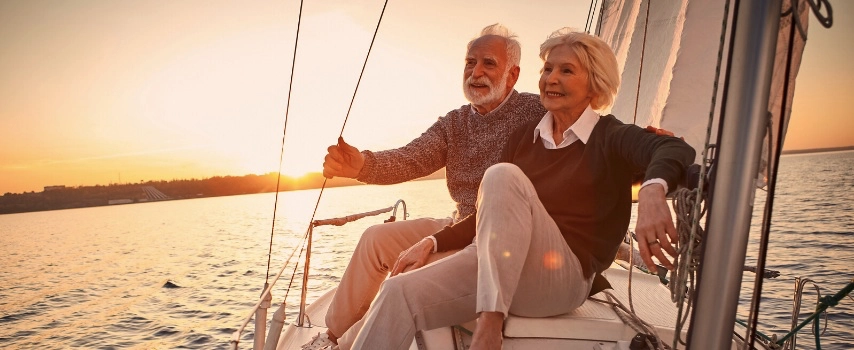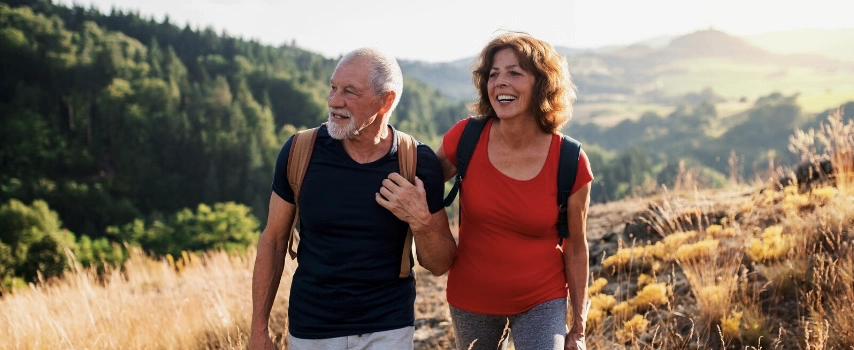Expert Health Advice for Senior Travellers

Stay healthy on the road with our safety tips for seniors travel
When you’ve earned your time in the sun and you’re ready to see the world, the last thing you want is poor health ruining your holiday.
To stay as healthy as possible during your travels as senior, you’ll need more than the right travel insurance to support you when you need it most – you need to look after your body just as you do at home.
Below, Professor Maria Fiatarone Singh – a Geriatrician at The University of Sydney – shares her excellent travel advice for older travellers, from in-flight wellbeing to staying healthy and active on the road.
So, keep reading to help make sure you’re well enough to enjoy yourself when you arrive at your destination.
Ready to book your big trip? Find out about our Cover-More travel insurance today.
Skip ahead to read:
- Two ways to stay healthy while flying
- Three tips for staying active while flying
- Five safety tips for travelling seniors
2 ways to stay healthy while flying
1. Limit your alcohol
It’s vital to drink more water than you ordinarily would and minimise alcohol intake to stay hydrated on long flights. This becomes increasingly important with age, especially for those with underlying chronic conditions affecting the circulatory system, liver, or for those taking medication.
“Don’t drink more alcohol than you usually would on the ground – one to two drinks at the most in a 24-hour period, interspersing with glasses of water,” says Professor Fiatarone Singh.
“If you don’t have as much muscle mass as you once did – which happens when you’re older – alcohol will stay in your bloodstream and go to your brain more quickly.”
2. Eat smaller portions during in-flight meals
Reduced gut function is a consideration for seniors, especially with restricted movement on a plane. Travellers with reflux, digestion and constipation problems should be careful to eat small quantities as the body is likely to process food more slowly in-flight.
“If you have reflux as an actual medical condition, avoid anything that contains caffeine, alcohol or peppermint as these foods increase the ability of acid to cause heartburn,” advises Professor Singh.
“Try to get up and walk after the meal to aid in digestion, too.”
3 exercises to support you while flying
Senior travellers should be conscious of an increased risk of blood clots, otherwise known as deep vein thrombosis (DVT).
Professor Singh says staying hydrated and completing the below specialised in-flight exercises can help reduce the risk of DVT and assist those who suffer from swelling:
In-flight exercise #1
While you’re sitting in your seat, you can do activities to improve your circulation such as moving your legs back and forth underneath you or going up and down on your toes.
This contracts your calf muscles and squeezes the lymphatics to send fluid from around your ankles back into your circulatory system. To make the exercise more intensive, cross your legs and use one leg to lift both (ensuring you uncross your legs when you’re finished).
In-flight exercise #2
Lower back pain can also be an issue on flights, especially for those who slouch when seated.
Be conscious to sit more upright – lifting your feet off the floor or tucking your legs under your seat will automatically take your body back into good alignment.
Try to do this for a few minutes at a time throughout the flight.
In-flight exercise #3
Get up and walk around every hour, when possible, which will get you out of that 90-degree angle that causes lower back pain.
Once you’re in the standing position, go up and down on your toes again.

5 safety tips for travelling seniors
1. Be prepared with medications and the right medical documents
According to Professor Fiatarone Singh, one thing older travellers should always carry with them is a recent, printed report from their physician.
“This can include your annual physical, a list of your medications and conditions, and hospital discharge papers, which can sometimes be hard to find at a moment’s notice.
“Overseas it’s almost impossible to get medical records quickly as laws exist to prevent emailing them.”
You should also have a big enough supply of your usual medications in your carry-on luggage, in case your return home is delayed and you unexpectedly need to spend more time somewhere – you don’t want to have to suddenly find another, unknown brand when overseas.
Be very careful of generic brands in unregulated countries as the formulations of your usual medications can differ.
Got an existing condition and want to travel? Discover the existing medical conditions we can provide protection for.
2. Maintain healthy food habits
Much like air travel, try not to overeat and keep alcohol consumption to a minimum, even if you don’t have a medical issue.
“It’s easy to overdo it on vacations but try not to let your good habits slip away,” says Professor Singh.
“If you have any conditions related to nutrition like diabetes, keep to the same rules you have at home.”
If you’re not sure of water quality, drink from a sealed water bottle, be careful of ice and brushing your teeth, and don’t consume alcohol if you’re not sure how it’s made.
Craving a holiday? Check out our article about the best destinations for seniors.
3. Put your best foot forward
Professor Fiatarone Singh says people are generally more active on holiday, particularly through walking. Staying on top of foot health is vital so see a podiatrist before you leave and have good footwear. Correctly fitted orthotics can also help avoid pressure ulcers, blisters, and callouses.
Senior travellers also need to be extra diligent to avoid cellulitis – a common bacterial infection – at all costs.
“If you get a cut, things can spiral down quickly, so don’t walk barefoot,” suggests Professor Singh.
“People with diabetes are particularly at risk when they have neuropathy so they can’t feel a cut on their feet, combined with peripheral vascular disease, which makes it incredibly difficult to heal from an injury.”
You or your travelling partner should inspect your feet every night to check for any damage; preventing an infection is key.
4. Be aware of your heart health
For older travellers with heart disease who don’t typically have chest pains, you could suddenly have new symptoms from undertaking more activity than usual.
If you feel anything that’s out of the ordinary, or if you have angina and notice a sudden change in pattern, seek medical help immediately.
“Unstable angina is an emergency,” advises Professor Singh.
5. Stay active
Strength training can be highly beneficial for seniors so if you regularly exercise, you don’t want to lose all that muscle you’ve built if you’re on holiday for a few weeks.
If you’re checking into accommodation with no gym, you still have options – you just need to get creative.
“Lots of things can be done with body weight like using suitcases to do bicep curls or doing push-ups off the end of the bed or bedside table – you can use simple body weight and simple means of resistance,” says Professor Singh.
“You can also do isometric contractions, for example, if you sit under a desk and put your palm under the table or another immovable object and push up, which will give you a bicep contraction.
“You can do isometric contractions wherever you are, even on a plane; it’s free, it’s almost as good as a gym exercise to maintain muscle strength in the short term, and it’s very safe.”
Travellers shouldn’t try movements they wouldn’t normally do, though, especially those involving shoulders. For example, rotator cuff tears are a risk when putting a suitcase onto a shelf far above your head, or when pulling a heavy weight like luggage far behind you.
To find out more about travelling safely as a senior, discover our travel insurance benefits and get the answers to your seniors travel questions here.
Want us to safeguard your dream trip?
Find our best Cover-More travel insurance for seniors today.
Material on this website is provided for informational purposes only. It is general information and discussion about medicine, health and related subjects may not apply to you as an individual and is not a substitute for your own doctor’s medical care or advice. The words and other content provided on this website, and in any linked materials, are not intended and should not be construed as medical advice. If the reader or any other person has a medical concern, they should consult with an appropriately licensed physician or other health care worker. Nothing contained on the website is intended to establish a physician-patient relationship, to replace the services of a trained physician or health care professional, or otherwise to be a substitute for professional medical advice, diagnosis, or treatment. The views and opinions expressed on this website have no relation to those of any academic, hospital, practice or other institution with which the authors are affiliated. They do not necessarily reflect the opinions of Cover-More Insurance Services Pty Ltd. Never disregard medical advice or delay seeking medical care because of something you have read on or accessed through this website. If you think you may have a medical emergency, call your doctor or emergency services immediately.